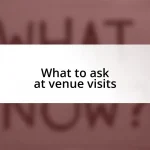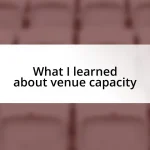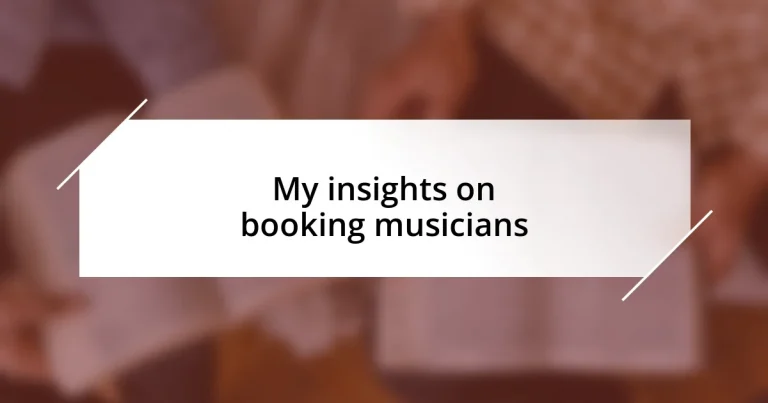Key takeaways:
- Effective communication is crucial in the musician booking process, helping to avoid misunderstandings and ensuring both parties are aligned.
- Identifying event needs, such as venue acoustics and audience preferences, is fundamental for choosing the right musician to enhance the experience.
- Research and evaluate musicians thoroughly through their portfolios, paying attention to genre compatibility, performance experience, and testimonials.
- Finalizing contracts with clear details and maintaining a personal touch fosters a positive relationship and ensures a smoother collaboration.
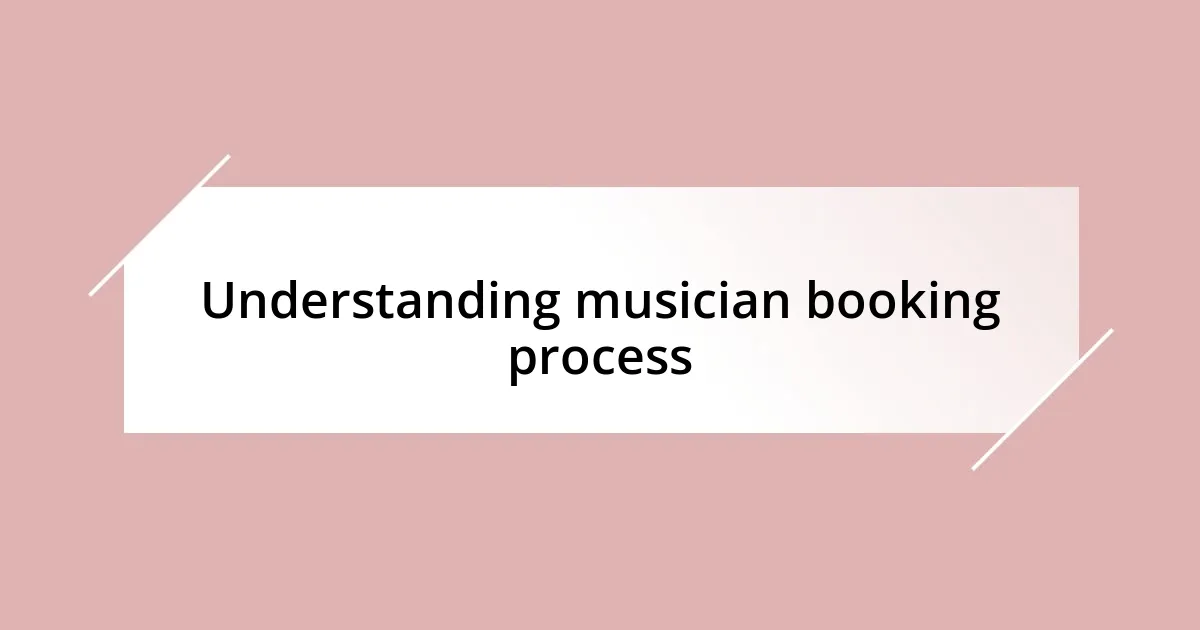
Understanding musician booking process
The musician booking process can seem daunting, especially if it’s your first time. I remember when I first tried to book a local band for an event, and I felt overwhelmed by the multiple details to juggle—from contracts to technical riders. Have you ever thought about how crucial it is to understand each step? Knowing what to expect not only eases your mind but also sets the stage for a smooth collaboration.
One of the most important aspects of booking musicians is communication. Early on in my experiences, I learned that clear communication helps avoid misunderstandings and ensures that both parties are on the same page. For instance, I once had a situation where a band showed up with entirely different equipment than what was discussed. It taught me to always confirm technical requirements in detail beforehand. Isn’t it fascinating how a simple conversation can save so much stress later on?
Timing also plays a vital role in the booking process. I’ve discovered that reaching out well in advance gives you a better chance of securing your ideal artist. The excitement of planning an event often leads us to rush, but I’ve found that patience pays off—many musicians have busy schedules and appreciate being contacted early. Have you ever missed out on a favorite artist simply due to timing? It’s a valuable lesson I learned that I carry with me to this day.
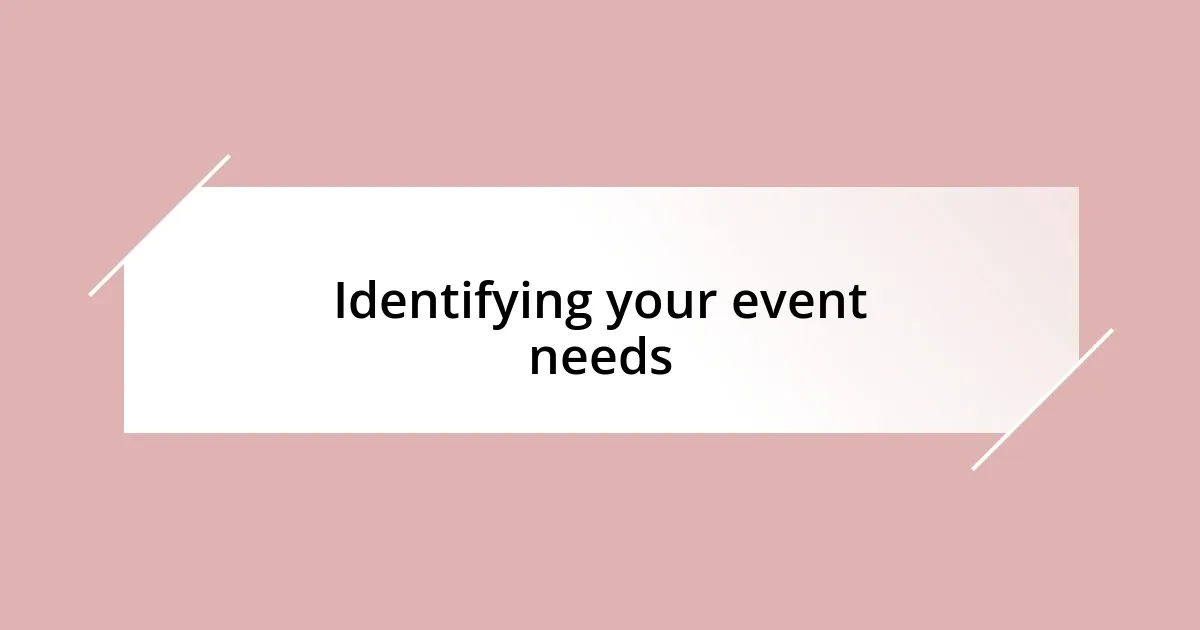
Identifying your event needs
Identifying your event needs is the bedrock of a successful musician booking experience. I remember when I planned an outdoor wedding; I quickly realized that the venue’s acoustics would shape my musician choices. An artist suited for a cozy indoor space might not translate well to an open field. Understanding your event’s specifics—like location, duration, and atmosphere—makes a significant difference in creating the right vibe.
Think about the kind of energy you want to evoke at your event. I once attended a corporate event where the live music completely misaligned with the audience’s expectations. The performers delivered an upbeat rock set, while the crowd yearned for something more subdued and sophisticated. Learning to match the music style with your audience goes beyond just personal taste; it’s about enhancing the event experience for everyone involved.
Finally, budget considerations are essential when determining your event needs. In my early days of organizing, I overlooked essential details, like travel expenses and accommodation for out-of-town musicians. This oversight led to unnecessary stress as I juggled expenses. Once I started budgeting holistically, incorporating all possible costs, I not only enhanced my planning efficiency but also found it easier to negotiate and secure talented performers within my means.
| Event Aspect | Considerations |
|---|---|
| Venue Type | Indoor vs. Outdoor – acoustics matter |
| Audience Preference | Match energy and style to audience |
| Budget | Include all associated costs |

Researching potential musicians
Researching potential musicians is vital for ensuring a successful event. It’s fascinating how the right musician can elevate the atmosphere, while the wrong choice can lead to disappointment. I recall a time when I spent hours combing through online platforms, listening to demos and watching videos. Each artist sparked memories or emotions, helping me connect with what was best for my event. I learned that immersing myself in their previous work brought clarity to my decisions.
When diving into your research, make sure to consider the following facets:
- Genre Compatibility: Ensure the musician’s style aligns with your event theme.
- Performance Experience: Look for their past gigs—experience can impact their stage presence.
- Social Media Presence: A strong online presence can indicate a musician’s popularity and engagement with their audience.
By focusing on these aspects, you’ll not only find artists who fit your vision but also establish a deeper connection with their work. This connection is invaluable in making the final selection feel right.
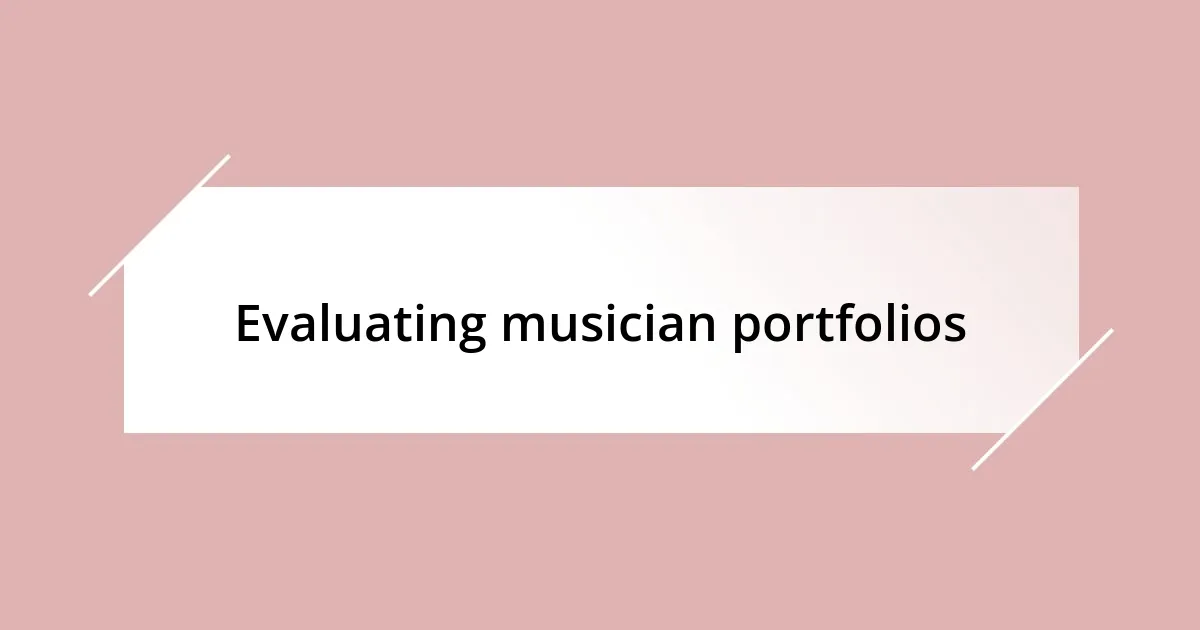
Evaluating musician portfolios
When evaluating musician portfolios, I find it essential to focus on their overall presentation and consistency. I’ve seen artists with stunning visuals but lackluster audio quality; it’s an immediate red flag. How can you choose the right performer if their portfolio doesn’t reflect their true musical capabilities? A quality recording should always accompany impressive imagery, as it gives you a well-rounded view of their talent.
The diversity in a musician’s portfolio can also be telling. I recall browsing through a singer-songwriter’s collection where every track showcased a unique storytelling ability. This variety not only demonstrated versatility but also made me feel confident in their ability to adapt to different vibes at my event. I often ask myself, does their music evoke emotion? If their tracks can stir up feelings, I know they have the potential to resonate with my audience.
Lastly, testimonials and reviews hold significant weight when reviewing portfolios. I’ve often relied on feedback from previous clients to guide my decisions. For instance, I once booked a band that received rave reviews for their interaction with the crowd. They were praised not just for their music but for creating an unforgettable experience. As you evaluate portfolios, consider these insights; they can be the deciding factor between good music and a truly remarkable event.
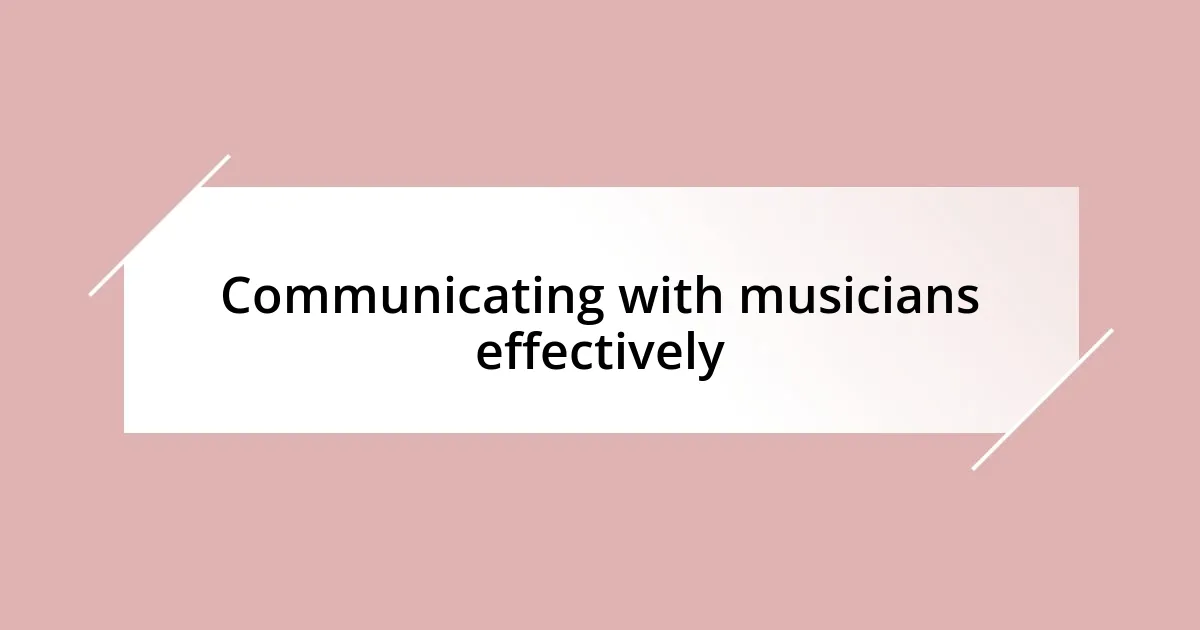
Communicating with musicians effectively
Effective communication with musicians goes beyond simply sharing event details; it’s about building a relationship grounded in clarity and mutual understanding. I remember when I first started booking musicians; I was hesitant to ask questions for fear of seeming uninformed. However, I quickly learned that the more I communicated, the easier it became to gauge their enthusiasm and willingness. Have you ever felt that initial awkwardness? I can assure you, once you break the ice, everything flows much smoother.
Setting clear expectations is another crucial aspect of this communication process. I once worked with a band where I failed to specify the time they would need for setup. This oversight led to a rushed soundcheck, leaving both the musicians and myself feeling frazzled. In hindsight, I realized how important it is to outline not just performance times but also logistical details like breaks and sound requirements. Wouldn’t it make your experience less stressful to ensure everyone is on the same page from the start?
Lastly, active listening should not be overlooked in these conversations. Musicians often have valuable insights based on their previous experiences that can enhance your event. I recall a time when a guitarist suggested a unique song arrangement that transformed the atmosphere of the event. I found myself contemplating how often we overlook such creative input. By truly listening and valuing their perspectives, you foster a collaborative environment that benefits everyone involved. Isn’t it rewarding when both parties walk away feeling satisfied?
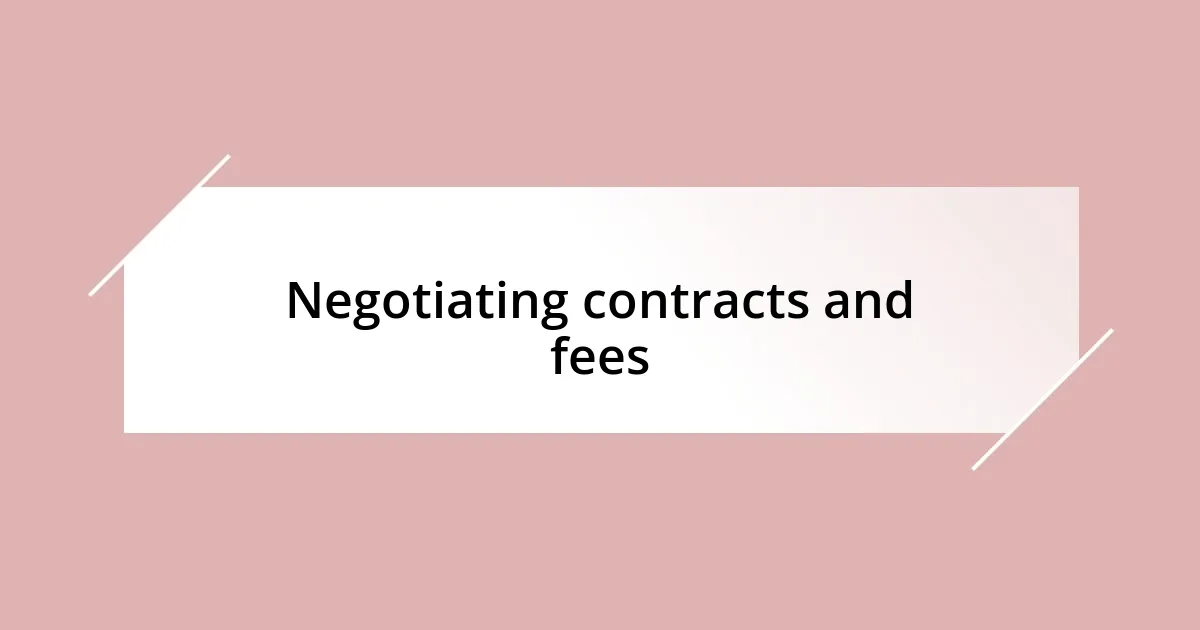
Negotiating contracts and fees
When it comes to negotiating contracts and fees, I’ve learned that transparency is key. I remember a gig where I initially offered a sum that seemed fair to me, but the musicians hesitated. When we dug deeper into their needs, we discovered they had specific expenses for equipment. What happened next? We reached a mutual agreement that respected their worth and ensured I got the quality I desired. Isn’t it fascinating how open conversation can lead to a win-win?
Fees can vary significantly among musicians, making it vital to understand their value. Early in my booking journey, I encountered a talented act whose fee was higher than expected. Initially, I hesitated, but after watching them perform live, I understood why. Their stage presence and audience connection were unmatched. How often do we undervalue the intangibles that contribute to an unforgettable experience? In these moments, I’ve learned that investing in quality can elevate an event beyond expectation.
Moreover, don’t shy away from discussing potential add-ons or extras that could enhance the experience. I recall negotiating with a DJ who suggested including lighting effects for an additional fee. While it was an extra expense, the impact on the atmosphere was undeniable. Reflecting on that, I realized that sometimes, saying “yes” to a slight increase in budget can transform an event, making it stand out. Wouldn’t you agree that it’s worth considering the overall experience when budgeting?
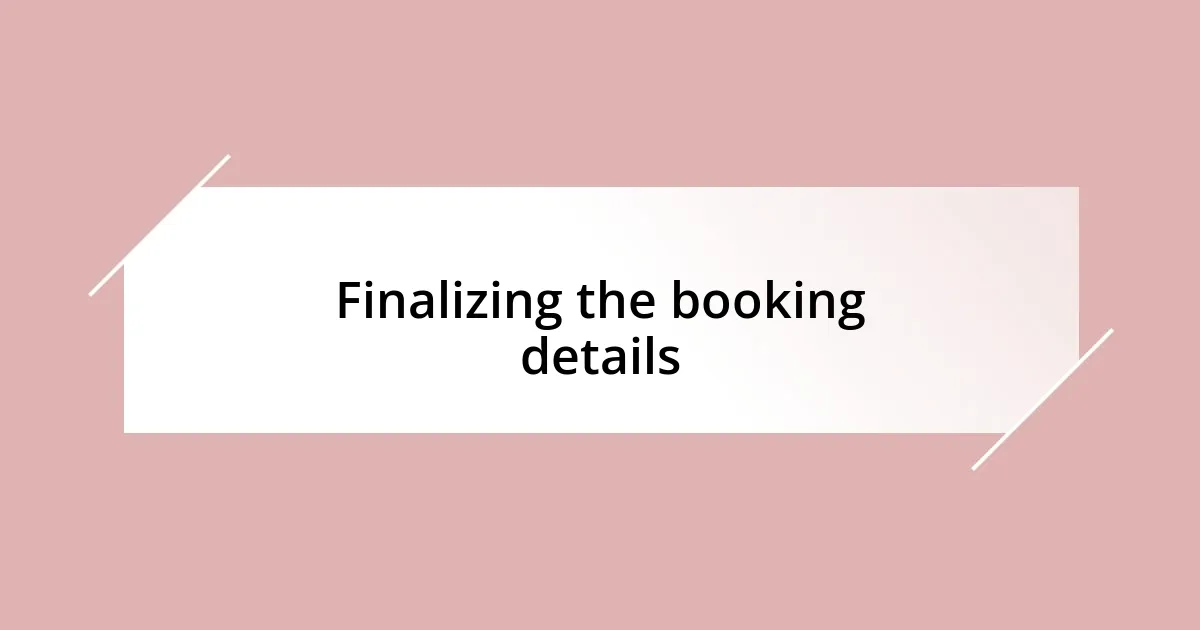
Finalizing the booking details
Once you’ve settled on your musician, it’s time to finalize the booking details, and I can’t stress enough how important this step is. I once booked a solo artist for an outdoor event but overlooked confirming the details about electrical needs. Can you imagine the panic I felt when, on the day of the event, we realized there was no power source nearby? It was a stressful lesson in the importance of clarity. Ensuring you and the artist agree on aspects like setup time, performance duration, and any breaks makes a world of difference.
I’ve also found that putting everything in writing helps solidify the agreement. For instance, when I booked a jazz trio last summer, I made a comprehensive contract that outlined every detail, from arrival time to equipment needs and payment terms. Why is this so valuable? Well, it not only protects both parties but also serves as a reference point if any questions arise later. Have you ever experienced confusion over who was responsible for what? A solid contract can easily eliminate that ambiguity.
Additionally, don’t underestimate the importance of a personal touch even in the final details. After solidifying the logistics, I always like to send a brief, friendly message reaffirming my excitement about the collaboration. It sets a positive tone and reinforces a sense of partnership. Isn’t it reassuring to know that, in the midst of all the planning, you’ve made an effort to connect on a personal level? That little gesture can foster goodwill that enhances the overall experience for everyone involved.







